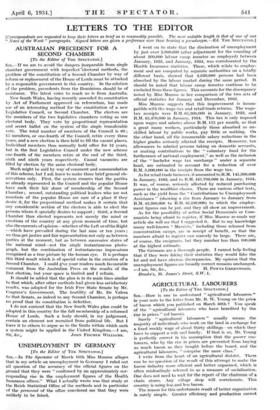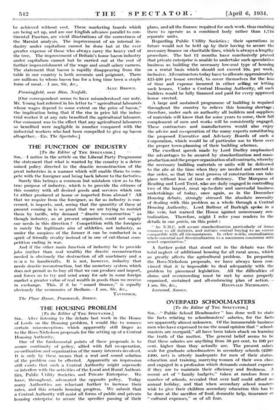AGRICULTURAL LABOURERS
[To the Editor of TILE SPECTATOR.] Sia,—How is one to understand " agricultural labourers " in your note to the letter from Mr. B. W. Young on the price of bacon which you published on March 80th ? You speak of the " agricultural labourers who have benefited by the rise in prices " (of bacon).
Surely " agricultural labourers " usually means the majority of individuals who work on the land in exchange for a fixed weekly wage of about thirty shillings—on which they have to support a wife and family. If that is so, Mr. Young is perfectly correct in his assumption that the poorer cus- tomers, who by the rise in prices are prevented from buying as much bacon as they bought before the board, and the agricultural labourers, " comprise the same class."
I write from the heart of an agricultural district. There can be no question of the result of this attempt to make the bacon industry more efficient and better organized, which is often misleadingly referred to as a measure of socialization. One does not need to wait for the report of the chairman of a chain stores. Any village shop will corroborate. This country is using less and less bacon.
The reason for this unfortunate result of better organization is surely simple. Greater efficiency and production cannot be achieved without cost. Thee& marketing boards which are being set up, and are our English advance parallel to con- tinental Fascism, are vivid illustrations of the correctness of the Marxist analysis. The improvement of an internal in- dustry under capitalism cannot be done but at the ever greater expense of those who always carry the heaVy end of the tree. The improvement of Britain's home bacon industry under capitalism cannot but be carried out at the Cost of further impoverishment of the wage and small salary earners. The statement that bacon is rapidly disappearing from the table in our country is both accurate and poignant. There are millions to whom bacon has for a long time been a staple form of ineat.—I am, Sir, &e., ALEC BROWN. Fressingfield, near hiss, Norfolk.
[Our correspondent seems to have misunderstood our note. Mr. Young had referredin his letter to " agricultural labourers whose, wages depend to some extent on the price of bacon,'' the implication being that if the rise in price hit the indus- trial worker it at any rate benefited the -agricultural labourer. Our comment was to the effect that any agricultural labourers so benefited were negligible in. number compared with the industrial workers who had been compelled to give up bacon altogether.—En. The Spectator.)









































 Previous page
Previous page